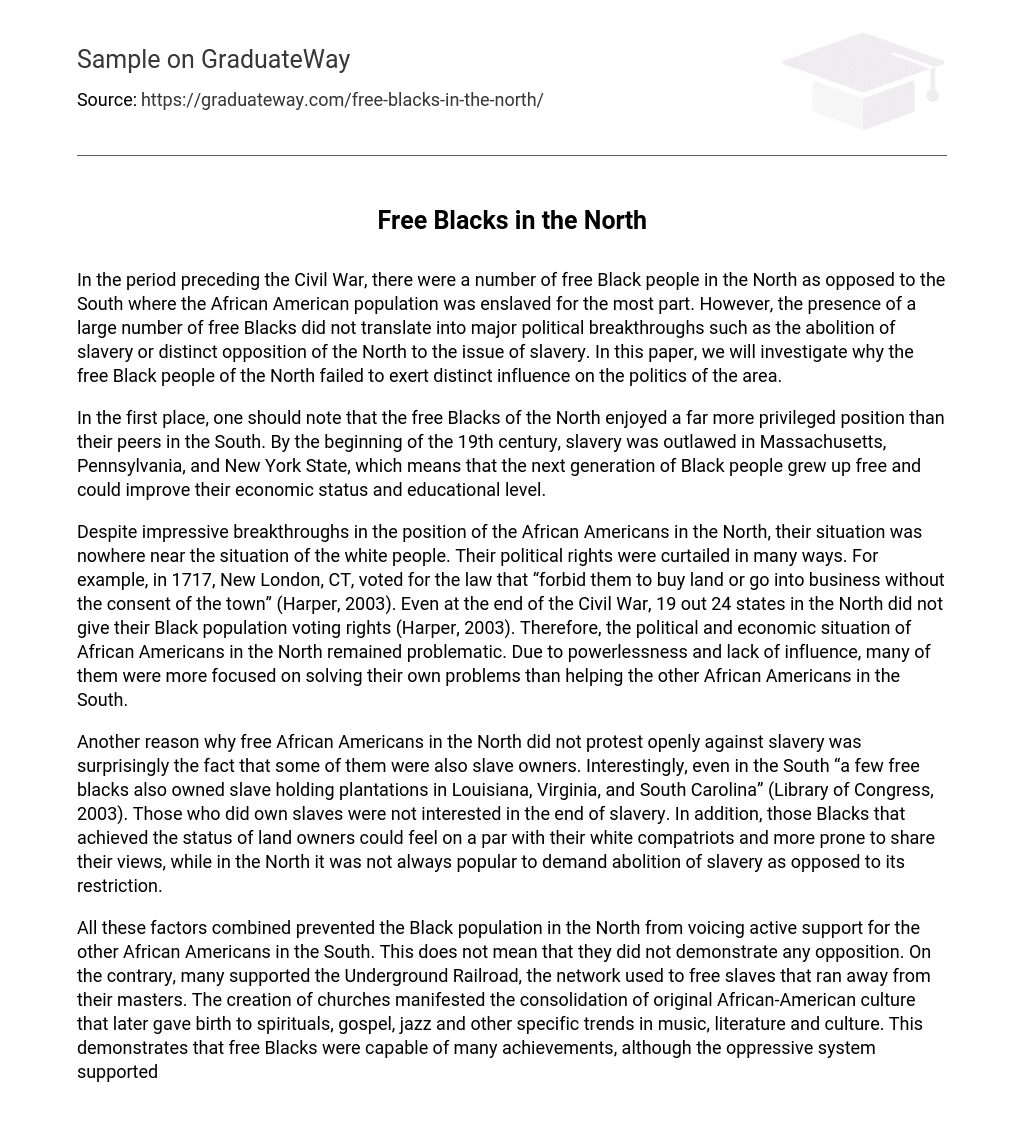In the period preceding the Civil War, there were a number of free Black people in the North as opposed to the South where the African American population was enslaved for the most part. However, the presence of a large number of free Blacks did not translate into major political breakthroughs such as the abolition of slavery or distinct opposition of the North to the issue of slavery. In this paper, we will investigate why the free Black people of the North failed to exert distinct influence on the politics of the area.
In the first place, one should note that the free Blacks of the North enjoyed a far more privileged position than their peers in the South. By the beginning of the 19th century, slavery was outlawed in Massachusetts, Pennsylvania, and New York State, which means that the next generation of Black people grew up free and could improve their economic status and educational level.
Despite impressive breakthroughs in the position of the African Americans in the North, their situation was nowhere near the situation of the white people. Their political rights were curtailed in many ways. For example, in 1717, New London, CT, voted for the law that “forbid them to buy land or go into business without the consent of the town” (Harper, 2003). Even at the end of the Civil War, 19 out 24 states in the North did not give their Black population voting rights (Harper, 2003). Therefore, the political and economic situation of African Americans in the North remained problematic. Due to powerlessness and lack of influence, many of them were more focused on solving their own problems than helping the other African Americans in the South.
Another reason why free African Americans in the North did not protest openly against slavery was surprisingly the fact that some of them were also slave owners. Interestingly, even in the South “a few free blacks also owned slave holding plantations in Louisiana, Virginia, and South Carolina” (Library of Congress, 2003). Those who did own slaves were not interested in the end of slavery. In addition, those Blacks that achieved the status of land owners could feel on a par with their white compatriots and more prone to share their views, while in the North it was not always popular to demand abolition of slavery as opposed to its restriction.
All these factors combined prevented the Black population in the North from voicing active support for the other African Americans in the South. This does not mean that they did not demonstrate any opposition. On the contrary, many supported the Underground Railroad, the network used to free slaves that ran away from their masters. The creation of churches manifested the consolidation of original African-American culture that later gave birth to spirituals, gospel, jazz and other specific trends in music, literature and culture. This demonstrates that free Blacks were capable of many achievements, although the oppressive system supported by the white majority did not allow them room for self-expression.
Annotated Bibliography
Adams, M. (1995). War Comes Again: Comparative Vistas on the Civil War and World War II. Oxford: Oxford University Press.
The publication presents a comparison of the two great wars in American history, highlighting the constitutionality of both and the pre-war situation on the even of each warfare.
Chiu, T., & Robinson, N. Free Blacks of the North. Retrieved December 13, 2006, from http://www.teachersnetwork.org/readysettech/olson/student.ppt.
The online teaching material outlines the difference between the lives of Blacks in the North and South.
Collins, B. (1981). The Origins of America’s Civil War. New York, Holmes & Meier.
The book presents a comprehensive overview of the events that happened in the nation leading up to the explosion we now know as the Civil War.
Grant, D. (1996). The Unequal Sovereigns of a Slaveholding Land”: The North as Subject in Whittier’s “The Panorama”. Criticism 38(4), pp. 521+.
The article in the literary magazine explores the anti-slavery poetry of Whittier that criticizes Northern compromisers and seeks to reveal their hypocrisy. As the popular poetry of the American Revolution, it gives one an idea of what was going on in people’s minds at that time.
Greene, L. G. (1942). The Negro in Colonial New England, 1620-1776. N.Y.: Columbia University Press.
This text presents the life of the African Americans in New England in the colonial period, leading to the conclusion that the difference in their conditions from their Southern “colleagues” was only marginal.
Harper, D. (2003). Exclusion of Free Blacks. Retrieved December 13, 2006, from http://www.slavenorth.com/exclusion.htm
The text vividly portrays the problems faced by free Blacks in the North.
Library of Congress. (2003). Free Blacks in the Antebellum Period. Retrieved December 13, 2006, from http://memory.loc.gov/ammem/aaohtml/exhibit/aopart2.html
The life of freed African Americans in the United States in the ante-bellum period, their hurdles and achievements are the subject of this article.
McPherson, J.M. (1988). Battle Cry of Freedom: The Civil War Era. Oxford, Oxford University Press.
The book explores the situation in the North and South before the Civil War, analyzes causes that led to it, and the impact of slavery on the war beginning.





